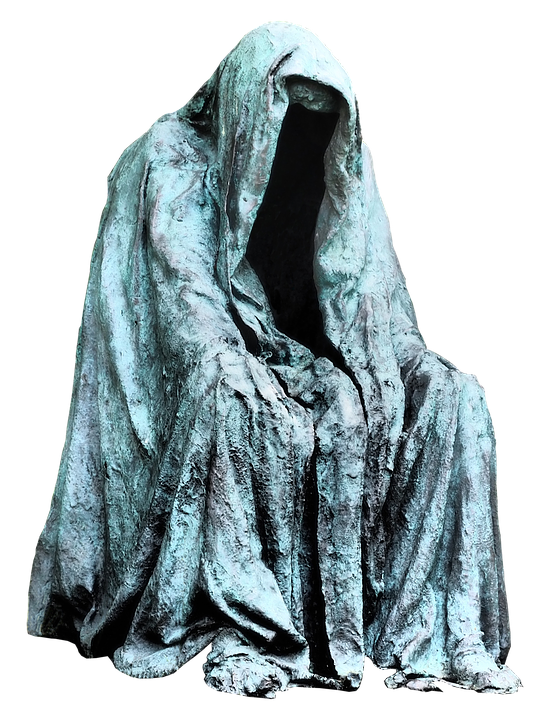The Story of A Great Poet-Philosopher & His Impossible Love

Aerial Photographs of A Subterranean Labyrinth
There are some writers in whom one can see one’s own possibilities. And that is the relationship one forges with those writers when one engages them. I never could see my own possibilities in Kierkegaard. Not with my eyes open. But, there are two ways to understand. You can understand without knowing how you understand and you can understand knowing precisely how you understand. Understanding with the eyes closed and understanding with the eyes open. I never could understand Kierkegaard with my eyes open. He was too many, too much, too elusive. Where was his core self? It wasn’t until I realized that at his core was a ball of molten poetry that I was finally able to see him, and with him, myself.
Whatever else he was or wasn’t, he was a great poet of the ideal, of longing, of obsession. I had already understood Kierkegaard with my eyes closed. The way for example if one were asked to explain a certain poem one wouldn’t even know where to start, only that some great spoon had stirred one to the depths. I had understood Kierkegaard all along with my eyes closed, but now I knew the earth of him, around which the many moons resolved.”
What do you suppose, in Soren Kierkegaard, is the well-spring of all that sorrow?
The best place to begin is with his biography. There are two people to whom Kierkegaard dedicates his writing. His father, who as an eight-year-old child laborer, hungry, angry and deprived, cursed God from a mountain-top, and 70 years later still could not forget it or forgive himself, is one. And Regina Olsen, whom Kierkegaard drags into immortality having abandoned her in the world, is the other.
These relationships can’t answer for everything. At the end there will still be question marks weaving riddles above his head and question marks etched like a tribal scarring into his broad pale brow. But these are two places where one can reasonably begin.
The father sires seven children, only two of whom outlive him, Soren and older brother Peter. The father believes this is part of God’s retribution against his inexpiable sin.
Thus, young Soren is raised in an atmosphere of metaphysical gloom and ever-present guilt, in the shadow of a father who believes there was nothing for which he can hope, neither in this world, nor in the next.
But this same father also gets Kierkegaard’s imagination going. Father and son don’t get out much, but the father often escorts young Soren around their home as if along a busy town thoroughfare. There they encounter imaginary men and women and dodge imaginary clattering carriages and see brilliant imaginary sights.
It is on this thoroughfare, to a large extent, that Kierkegaard remains.
‘Humanly speaking, I was insanely raised,’ Kierkegaard will later write.

Accounts of Soren Kierkegaard, by people who knew him across the gamut of his years, describe him as gregarious, thoroughly charming, and wholly lovable. A child with children. A wit with the witty. He cultivated gaiety, but also a kind of intimate immediacy, and presented himself around Copenhagen as sociable in the extreme.
Privately he would lapse into periods of brooding and melancholy.
These he kept hidden.
But, how wondrous those lapses must have been. Filled with the extraordinary ordinary experiences of a self in the process of re-creating into a world literary figure and matchless philosopher. And filled too with his gift for the play of spirits in a theater of the gods.
The other important part of Kierkegaard’s biography is his engagement to Regina Olsen.
Olsen is 10 years Kierkegaard’s junior when they meet. She is 14. He is at a friend’s home where she is taking piano lessons.
Unrealistic, romantic, as Kierkegaard is, he knows well enough to wait until she is 16 before declaring his devotion. “Since I first laid eyes on you,” he tells Olsen, “I knew.”
At once, they are in love and the next moment they are engaged.
A year into this engagement, however, Kierkegaard has a crisis. He determines to himself that he is ill-suited for marriage. He no longer believes it would be ethical to drag another person into the inward life to which he believes he has been called.
He doesn’t want Olsen to feel rejected, so he tries every indirect method his febrile mind can conjure to provoke in Olsen a realization that she would be better off without him. He presents himself as a cad, aloof, cruel—the opposite of what he really is.
She loves him unceasingly.
Her father tries reason. “You mustn’t,” he insists. “Regina will harm herself. She believes in you so deeply.”
“Is there someone else?” Olsen will finally have to ask. “Will there be someone else? Is that why you wish to leave me?”
At the end of his nuance, his delicacy, his generosity, Kierkegaard will reply, “Maybe not now, but in 10 years time, I may want some young girl to fan the flames of my lust again.”
After the broken engagement has become official, Kierkegaard retreats to the cloister of a wholly interior life. He has chosen duty over happiness. This is his one true failing. He does not believe there is enough room in his life for both.

Olsen lingers in Kierkegaard’s mind as he writes, a symbol, a token, a medal of valor from his brief stint in worldly life, spurring his insight, his dialectical intensity, his fantastical mask-making, and his critical ingenuity.
He never imagines her to marry, but she does marry.
Maybe he had thought that because he made the sacrifice, she would be returned to him the way faithful Abraham’s son Isaac is spared and returned to Abraham.
But, Olsen’s marriage, to the philosopher Friedrich Schlegel, is a good one.
Olsen is bright eyed with her dull but perfectly kind and thoughtful husband.
Kierkegaard, at age 42, a bachelor, esteemed in his lifetime as the greatest religious thinker Denmark has ever produced (several thousand people attend his Church funeral) gets to dead, after first dropping in the street and being taken to a hospital.
He has not much money left. He had been living on an allowance from his father, who after that impoverished childhood, came into a modest income.
It is even said that he had just taken the last of that allowance money out of trust on the day he fell in the street. And it was with that last money that he paid his hospital stay.
In the room he left behind, there was a locked drawer and in that drawer there were two envelopes addressed to his brother Peter, a local priest, with whom Kierkegaard had a strained relationship.
One can imagine the competition for the father’s graces making this sibling connection almost impossible from the start.
One can imagine the one who had become a priest being more of a reassurance to the guilt stricken father, than the one who had become something more like a religious jester.
One can imagine, too, the genius of Kierkegaard as he might have been from a pulpit. God, what an opportunity was lost to history when he was not simply ceded an honorary divinity certificate and offered a local Copenhagen parish.
One of the envelopes contains Kierkegaard’s will. In it Kierkegaard asserts that even though he and Olsen were only engaged he takes that engagement just as seriously as though they had married.
Everything, including all of his writings, go to Olsen.
“The one unnamed, whose name some day will be named,” he writes, “to whom all my work is dedicated, is my erstwhile fiancée Regina Schlegel.”
A year or so afterwards, Olsen will enter into a correspondence with Kierkegaard’s nephew, a hot-blooded, passionate type, not too different from Kierkegaard in some ways, who had been the one who tended Kierkegaard during his last days alive.
“You say he mentioned me when he lay ill,” Olsen will write. “I do so much want to know what he said.”
According to the nephew, what the uncle said was: “I have my thorn in the flesh, like Paul. Hence, I could not be like other folk, so I concluded my task was to be the extraordinary. It was this that was the hindrance with Regina. I had believed it could be changed, but it could not, so I broke the engagement.”

Maudlin, if he did say it. But, maudlin or not, it would echo things he had said all along: “I am the corrective. I am the exception. I am the pinch of spice needed to impart a particular taste to the rest.”
Elsewhere he refers to “Some missed relationship between soul and body.” Elsewhere he refers to: “My silent despair.”
In the same letter, Olsen had also written, “I feel I have shirked a duty through cowardice. A duty not only toward Soren, but toward God to whom he sacrificed me. Whether he did this (as he himself sometimes thought might be the case) through an in-born tendency to self-torture, or as I take it that time and the results of his activities have shown, through an inner call from God.”
II
It is impossible for me not to be delighted with the vision of Soren Kierkegaard on the streets of Copenhagen, full of mischief, full of delight. A kinder, more ethereal, Socrates.
III
The poet Auden who wrote of Rilke that Rilke was “the greatest lesbian poet since Sappho,” also wrote that Kierkegaard sometimes carried on “like a spiritual prima-donna.”
IV
Soren Kierkegaard was able to treat the streets of Copenhagen as a large reception room in which to play at life. He wrote of being able to enter into rapprochement with anyone he chose, just by hooking them with his eyes.
Hans Brockner, a friend, a distant relative, an atheist philosopher, witness to this side of the man, writes of a meeting he had with Kierkegaard in the streets, shortly after Kierkegaard’s return from Berlin where he had sequestered himself after the broken engagement, writing with his mind aflame.
“He spoke of my doings and studies and told me that in Berlin he had longed for many things, among which was to see me. He could say such things with a characteristically winning expression. His smile and his look were expressive to a degree difficult to describe. He had a way of greeting one at a distance with a look. It was only a little movement of the eye and yet the expression meant so much. There was at times something infinitely gentle and loving in his look, but also something goading. He was able with a glance to put himself “en rapport” with a passer-by, as he expressed it. Anyone meeting that glance was either attracted or else repelled. Made embarrassed, uncertain.”
“I was once walking through a whole street with him while he explained how one can make psychological studies by so putting oneself en-rapport to passers-by and as he explained his theory he put it in practice with almost everyone we met. There was no one on whom his glance did not make an obvious impression.”
V
“What this age needs is not a genius,” writes Kierkegaard, “but a martyr who in order to teach men to obey would himself be obedient unto death. What this age needs is awakening and therefore someday not only my writings but my whole life, all the intriguing mystery of the machine will be studied and studied.”
VI
Kierkegaard wants to figure out what to do. He is so wildly alive in the world of potentialities. It is only in the world of actualities that he is still-born. He is never quite able to commit. Forget Regina Olsen! She’s a great symbol, obviously. But, even without that example, what did Kierkegaard ever commit to, except the one thing he did commit to?
Inwardness. The life of the spirit.

From early on he is asking himself: What is to be my mission?
He is not of the disposition to make things easier.
“Talk to me of justice,” Socrates says to the learned judge he stops on the streets of Athens. “You are the person of law. Help me to understand what justice is.”
The learned must be made to understand how little they have of learning before the true understanding can commence.
“It was intelligence and nothing else that had to be opposed,” Kierkegaard wrote. “Presumably that is why I who had the job was armed with an immense intelligence.”
“What is the well-spring of Kierkegaard’s sorrow?”
I must answer that I don’t believe anyone can live happily against his own nature.
VII
Kierkegaard’s nature is an analytical one. He’s an excellent candidate for a debate team. He’s such a great debater. If he decides, for his life’s task, to oppose intelligence, there is already something in that formulation that is quite tragic.
VIII
I can understand how the critical mind is an impediment. Always interfering and deciphering.
IX
However Kierkegaard disparaged the aesthetic life as one of the early stages, preceding the ethical and the religious, in many ways the aesthetic was his domain. It was his great stage in the sense too of a performance space. The aesthetic works were truer (however less exalted and sublime they seemed to him) on a simple level, and even on a very complex level, to who he was.
X
Toward the end of his life, Kierkegaard comes out as a Christian writer. He is no longer hiding. He is no longer playing games. He is no longer sounding through a mask. He believes he is speaking for Christianity.
I think of this Wilde line: “Give a man a mask and he’ll tell you the truth.”
XI
The conflict of being an extraordinarily intelligent human being who is at war with his own intelligence.
XII
Just shy of 40, Kierkegaard writes: “Our literature in this century has shown an almost abnormal richness in poetry. Our prose on the contrary has declined. We lacked a prose which bore the stamp of artistry. This lack I have supplied and this is why my writings will retain their importance in literature.”
This is the craftsman who knows it is not just what he says but how he says it.
XIII
No one can help us develop inwardness. Certainly no church. That would just be more hollow externals.
Kierkegaard’s inwardness was complicated because it led to brooding introspection which led to despair.
But it was also despair which led to brooding introspection which led to the inwardness.
XIV
Kierkegaard writes of the “jammed lock” of inwardness. The despair that doesn’t lead to eternity. That paralyzes, cripples.

XV
When Regina Olsen gets the news that Kierkegaard has willed her his worldly estate, her response, after consultation with her husband, is to politely demur. Olsen asks only that a few personal effects be returned.
XVI
The ideal works in poetry. It works in the aesthetic realm. But when these standards are applied to ordinary life, they are bound to fail.
XVII
“It’s really not worth bothering oneself with men,” writes Kierkegaard, “except with those who have given their life for something or at least have religious or desperate energy enough to think of death every day.”
XVIII
One of the first things his father disapproves of early on, when Kierkegard is in his 20s, is his attraction to German Romanticism.
Young Soren is meant to study theology, to study philosophy.
But it is the poets to whom he responds.
He prefers the thorn to the rose.
© Yahia Lababidi

(Images: Pixabay)